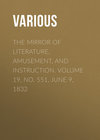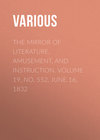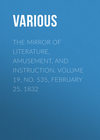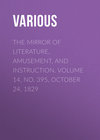Loe raamatut: «The Continental Classics, Volume XVIII., Mystery Tales», lehekülg 18
XVII
THE DELUGE
Count Kallash finally decided on his course of action. It was too late to seek justice for his sister, but not too late for a tardy reparation. The gang had prospered greatly, and the share of Baroness von Döring and Bodlevski already amounted to a very large figure. Count Kallash determined to demand for his sister a sum equal to that of the securities in her name which Natasha had stolen, calculating that this would be enough to maintain his sister in peace and comfort to the end of her days. His own life was too stormy, too full of risks for him to allow his sister's fate to depend on his, so he had decided to settle her in some quiet nook where, free from danger, she might dream away her few remaining years.
To his surprise Baroness von Döring flatly refused to be put under contribution.
"Your demand is outrageous," she said. "I am not going to be the victim of any such plot!"
"Very well, I will compel you to unmask?"
"To unmask? What do you mean, count? You forget yourself!"
"Well, then, I shall try to make you remember me!" And Kallash turned his back on her and strode from the room. A moment later, and she heard the door close loudly behind him.
The baroness had already told Bodlevski of her meeting with Princess Anna, and she now hurried to him for counsel. They agreed that their present position, with Kallash's threats hanging over their heads, was intolerable. But what was to be done?
Bodlevski paced up and down the room, biting his lips, and seeking some decisive plan.
"We must act in such a way," he said, coming to a stand before the baroness, "as to get rid of this fellow once for all. I think he is dangerous, and it never does any harm to take proper precautions. Get the money ready, Natasha; we must give it to him."
"What! give him the money!" and the baroness threw up her hands. "Will that get us out of his power? Can we feel secure? It will only last till something new happens. At the first occasion–"
"Which will also be the last!" interrupted Bodlevski. "Suppose we do give him the money to-day; does that mean that we give it for good? Not at all! It will be back in my pocket to-morrow! Let us think it out properly!" and he gave her a friendly pat on the shoulder, and sat down in an easy chair in front of her.
The result of their deliberations was a little note addressed to Count Kallash:
"DEAR COUNT," it ran, "I was guilty of an act of folly toward you to-day. I am ashamed of it, and wish to make amends as soon as possible. We have always been good friends, so let us forget our little difference, the more so that an alliance is much more advantageous to us both than a quarrel. Come this evening to receive the money you spoke of, and to clasp in amity the hand of your devoted friend, VON D."
Kallash came about ten o'clock in the evening, and received from Bodlevski the sum of fifty thousand rubles in notes. The baroness was very amiable, and persuaded him to have some tea. There was not a suggestion of future difficulties, and everything seemed to promise perfect harmony for the future. Bodlevski talked over plans of future undertakings, and told him, with evident satisfaction, that they had just heard of the arrest of the younger Prince Shadursky, in Paris, for attempting to defraud a bank by a pretended sale of gold dust. Count Kallash was also gay, and a certain satisfaction filled his mind at the thought of his sister's security, as he felt the heavy packet of notes in his pocket. He smoked his cigar with evident satisfaction, sipping the fragrant tea from time to time. The conversation was gay and animated, and for some reason or other turned to the subject of clubs.
"Ah, yes," interposed Bodlevski, "a propos! I expect to be a member of the Yacht Club this summer. Let me recommend to you a new field of action. They will disport themselves on the green water, and we on the green cloth! By the way, I forgot to speak of it—I bought a boat the other day, a mere rowboat. It is on the Fontauka Canal, at the Simeonovski bridge. We must come for a row some day."
"Delightful," exclaimed the baroness. "But why some day? Why not to-night? The moon is beautiful, and, indeed, it is hardly dark at midnight. Your speaking of boats has filled me with a sudden desire to go rowing. What do you say, dear count?" and she turned amiably to Kallash.
Count Kallash at once consented, considering the baroness's idea an admirable one, and they were soon on their way toward the Simeonovski bridge.
"How delightful it is!" cried the baroness, some half hour later, as they were gliding over the quiet water. "Count, do you like strong sensations?" she asked suddenly.
"I am fond of strong sensations of every kind," he replied, taking up her challenge.
"Well, I am going to offer you a little sensation, though it always greatly affects me. Everything is just right for it, and I am in the humor, too."
"What is it to be?" asked Count Kallash indifferently.
"You will see in a moment. Do you know that there are underground canals in St. Petersburg?"
"In St. Petersburg?" asked Kallash in astonishment.
"Yes, in St. Petersburg! A whole series of underground rivers, wide enough for a boat to pass through. I have rowed along them several times. Does not that offer a new sensation, something quite unlike St. Petersburg?"
"Yes, it is certainly novel," answered Count Kallash, now interested.
"Where are they? Pray show them to me."
"There is one a few yards off. Shall we enter? You are not afraid?" she said with a smile of challenge.
"By no means—unless you command me to be afraid," Kallash replied in the same tone. "Let us enter at once!"
"Kasimir, turn under the arch!" and the boat cut across the canal toward a half circle of darkness. A moment more and the darkness engulfed them completely. They were somewhere under the Admiralty, not far from St. Isaac's Cathedral. Away ahead of them was a tiny half circle of light, where the canal joined the swiftly flowing Neva. Carriages rumbled like distant thunder above their heads.
"Deuce take it! it is really rather fine!" cried the count, with evident pleasure. "A meeting of pirates is all we need to make it perfect. It is a pity that we cannot see where we are!"
"Light a match. Have you any?" said the baroness.
"I have, and wax matches, too." The count took out a match and lit it, and the underground stream was lit by a faint ruddy glow. The channel, covered by a semi-circular arch, was just wide enough for one boat to pass through, with oars out. The black water flowed silently by in a sluggish, Stygian stream. Bats, startled by the light, fluttered in their faces, and then disappeared in the darkness.
As the boat glided on, the match burned out in Count Kallash's fingers. He threw it into the water, and opened his matchbox to take another.
At the same moment he felt a sharp blow on the head, followed by a second, and he sank senseless in the bottom of the boat.
"Where is the money?" cried Bodlevski, who had struck him with the handle of the oar. "Get his coat open!" and the baroness deftly drew the thick packet from the breast pocket of his coat. "Here it is! I have it!" she replied quickly.
"Now, overboard with him! Keep the body steady!" A dull splash, and then silence. "To-night we shall sleep secure!"
They counted without their host. Princess Anna had also her scheme of vengeance, and had worked it out, without a word to her brother. When Natasha and Bodlevski entered their apartment, they found the police in possession, and a few minutes later both were under arrest. Abundant evidence of fraud and forgery was found in their dwelling, and the vast Siberian solitudes avenged the death of their last victim.
JÖRGEN WILHELM BERGSÖE
THE AMPUTATED ARMS
It happened when I was about eighteen or nineteen years old (began Dr. Simsen). I was studying at the University, and being coached in anatomy by my old friend Sölling. He was an amusing fellow, this Sölling. Full of jokes and whimsical ideas, and equally merry, whether he was working at the dissecting table or brewing a punch for a jovial crowd.
He had but one fault—if one might call it so—and that was his exaggerated idea of punctuality. He grumbled if you were late two minutes; any longer delay would spoil the entire evening for him. He himself was never known to be late. At least not during the entire years of my studying.
One Wednesday evening our little circle of friends met as usual in my room at seven o'clock. I had made the customary preparations for the meeting, had borrowed three chairs—I had but one myself—had cleaned all my pipes, and had persuaded Hans to take the breakfast dishes from the sofa and carry them downstairs. One by one my friends arrived, the clock struck seven, and to our great astonishment, Sölling had not yet appeared. One, two, even five minutes passed before we heard him run upstairs and knock at the door with his characteristic short blows.
When he entered the room he looked so angry and at the same time so upset that I cried out: "What's the matter, Sölling? You look as if you had been robbed."
"That's exactly what has happened," replied Sölling angrily. "But it was no ordinary sneak thief," he added, hanging his overcoat behind the door.
"What have you lost?" asked my neighbor Nansen.
"Both arms from the new skeleton I've just recently received from the hospital," said Sölling with an expression as if his last cent had been taken from him. "It's vandalism!"
We burst out into loud laughter at this remarkable answer, but Sölling continued: "Can you imagine it? Both arms are gone, cut off at the shoulder joint;—and the strangest part of it is that the same thing has been done to my shabby old skeleton which stands in my bedroom, There wasn't an arm on either of them."
"That's too bad," I remarked. "For we were just going to study the anatomy of the arm to-night."
"Osteology," corrected Sölling gravely. "Get out your skeleton, little Simsen. It isn't as good as mine, but it will do for this evening."
I went to the corner where my anatomical treasures were hidden behind a green curtain—"the Museum," was what Sölling called it—but my astonishment was great when I found my skeleton in its accustomed place and wearing as usual my student's uniform—but without arms.
"The devil!" cried Sölling. "That was done by the same person who robbed me; the arms are taken off at the shoulder joint in exactly the same manner. You did it, Simsen!"
I declared my innocence, very angry at the abuse of my fine skeleton, while Nansen cried: "Wait a moment, I'll bring in mine. There hasn't been a soul in my room since this morning, I can swear to that. I'll be back in an instant."
He hurried into his room, but returned in a few moments greatly depressed and somewhat ashamed. The skeleton was in its usual place, but the arms were gone, cut off at the shoulder in exactly the same manner as mine.
The affair, mysterious in itself, had now come to be a serious matter. We lost ourselves in suggestions and explanations, none of which seemed to throw any light on the subject. Finally we sent a messenger to the other side of the house where, as I happened to know, was a new skeleton which the young student Ravn had recently received from the janitor of the hospital.
Ravn had gone out and taken the key with him. The messenger whom we had sent to the rooms of the Iceland students returned with the information that one of them had used the only skeleton they possessed to pummel the other with, and that consequently only the thigh bones were left unbroken.
What were we to do? We couldn't understand the matter at all. Sölling scolded and cursed and the company was about to break up when we heard some one coming noisily upstairs. The door was thrown open and a tall, thin figure appeared on the threshold—our good friend Niels Daae.
He was a strange chap, this Niels Daae, the true type of a species seldom found nowadays. He was no longer young, and by reason of a queer chain of circumstances, as he expressed it, he had been through nearly all the professions and could produce papers proving that he had been on the point of passing not one but three examinations.
He had begun with theology; but the story of the quarrel between Jacob and Esau had led him to take up the study of law. As a law student he had come across an interesting poisoning case, which had proved to him that a study of medicine was extremely necessary for lawyers; and he had taken up the study of medicine with such energy that he had forgotten all his law and was about to take his last examinations at the age of forty.
Niels Daae took the story of our troubles very seriously. "Every pot has two handles," he began. "Every sausage two ends, every question two sides, except this one—this has three." (Applause.) "When we look at it from the legal point of view there can be no doubt that it belongs in the category of ordinary theft. But from the fact that the thief took only the arms when he might have taken the entire skeleton, we must conclude that he is not in a responsible condition of mind, which therefore introduces a medical side to the affair. From a legal point of view, the thief must be convicted for robbery, or at least for the illegal appropriation of the property of others; but from the medical point of view, we must acquit him, because he is not responsible for his acts. Here we have two professions quarreling with one another, and who shall say which is right? But now I will introduce the theological point of view, and raise the entire affair up to a higher plane. Providence, in the material shape of a patron of mine in the country, whose children I have inoculated with the juice of wisdom, has sent me two fat geese and two first-class ducks. These animals are to be cooked and eaten this evening in Mathiesen's establishment, and I invite this honored company to join me there. Personally I look upon the disappearance of these arms as an all-wise intervention of Providence, which sets its own inscrutable wisdom up against the wisdom which we would otherwise have heard from the lips of my venerable friend Sölling."
Daae's confused speech was received with laughter and applause, and Sölling's weak protests were lost in the general delight at the invitation. I have often noticed that such improvised festivities are usually the most enjoyable, and so it was for us that evening. Niels Daae treated us to his ducks and to his most amusing jokes, Sölling sang his best songs, our jovial host Mathiesen told his wittiest stories, and the merriment was in full swing when we heard cries in the street, and then a rush of confused noises broken by screams of pain.
"There's been an accident," cried Sölling, running out to the door.
We all followed him and discovered that a pair of run-away horses had thrown a carriage against a tree, hurling the driver from his box, under the wheels. His right arm had been broken near the shoulder. In the twinkling of an eye the hall of festivities was transformed into an emergency hospital. Sölling shook his head as he examined the injury, and ordered the transport of the patient to the city hospital. It was his belief that the arm would have to be amputated, cut off at the shoulder joint, just as had been the case with our skeleton. "Damned odd coincidence, isn't it?" he remarked to me.
Our merry mood had vanished and we took our way, quiet and depressed, through the old avenues toward our home. For the first time in its existence possibly, our venerable "barracks," as we called the dormitory, saw its occupants returning home from an evening's bout just as the night watchman intoned his eleven o'clock verse.
"Just eleven," exclaimed Sölling. "It's too early to go to bed, and too late to go anywhere else. We'll go up to your room, little Simsen, and see if we can't have some sort of a lesson this evening. You have your colored plates and we'll try to get along with them. It's a nuisance that we should have lost those arms just this evening."
"The Doctor can have all the arms and legs he wants," grinned Hans, who came out of the doorway just in time to hear Sölling's last word.
"What do you mean, Hans?" asked Sölling in astonishment.
"It'll be easy enough to get them," said Hans. "They've torn down the planking around the Holy Trinity churchyard, and dug up the earth to build a new wall. I saw it myself, as I came past the church. Lord, what a lot of bones they've dug out there! There's arms and legs and heads, many more than the Doctor could possibly need."
"Much good that does us," answered Sölling. "They shut the gates at seven o'clock and it's after eleven already."
"Oh, yes, they shut them," grinned Hans again. "But there's another way to get in. If you go through the gate of the porcelain factory and over the courtyard, and through the mill in the fourth courtyard that leads out into Spring Street, there you will see where the planking is torn down and you can get into the churchyard easily."
"Hans, you're a genius!" exclaimed Sölling in delight. "Here, Simsen, you know that factory inside and out, you're so friendly with that fellow Outzen who lives there. Run along to him and let him give you the key of the mill. It will be easy to find an arm that isn't too much decayed. Hurry along, now; the rest of us will wait for you upstairs."
To be quite candid I must confess that I was not particularly eager to fulfill Sölling's command. I was at an age to have still a sufficient amount of reverence for death and the grave, and the mysterious occurrence of the stolen arms still ran through my mind. But I was still more afraid of Sölling's irony and of the laughter of my comrades, so I trotted off as carelessly as if I had been sent to buy a package of cigarettes.
It was some time before I could arouse the old janitor of the factory from his peaceful slumbers. I told him that I had an important message from Outzen, and hurried upstairs to the latter's room. Outzen was a strictly moral character; knowing this, I was prepared to have him refuse me the key which would let me into the fourth courtyard and from there into the cemetery. As I expected, Outzen took the matter very seriously. He closed the Hebrew Bible which he had been studying as I entered, turned up his lamp and looked at me in astonishment as I made my request.
"Why, my dear Simsen, it is a most sinful deed that you are about to do," he said gravely. "Take my advice and desist. You will get no key from me for any such cause. The peace of the grave is sacred. No man dare disturb it."
"And how about the gravedigger? He puts the newly dead down beside the old corpses, and lives as peacefully as anyone else."
"He is doing his duty," answered Outzen calmly. "But to disturb the peace of the grave from sheer daring, with the fumes of the punch still in your head,—that is a different matter,—that will surely be punished!"
His words irritated me. It is not very flattering, particularly if one is not yet twenty, to be told that you are about to perform a daring deed simply because you are drunk. Without any further reply to his protests I took the key from its place on the wall and ran downstairs two steps at a time, vowing to myself that I would take home an arm let cost what it would. I would show Outzen, and Sölling, and all the rest, what a devil of a fellow I was.
My heart beat rapidly as I stole through the long dark corridor, past the ruins of the old convent of St. Clara, into the so-called third courtyard. Here I took a lantern from the hall, lit it and crossed to the mill where the clay was prepared for the factory. The tall wheels and cylinders, with their straps and bolts, looked like weird creatures of the night in the dim light of my tallow candle. I felt my courage sinking even here, but I pulled myself together, opened the last door with my key and stepped out into the fourth courtyard. A moment later I stood on the dividing line between the cemetery and the factory.
The entire length of the tall blackened planking had been torn down. The pieces of it lay about, and the earth had been dug up to considerable depth, to make a foundation for a new wall between Life and Death. The uncanny emptiness of the place seized upon me. I halted involuntarily as if to harden myself against it. It was a raw, cold, stormy evening. The clouds flew past the moon in jagged fragments, so that the churchyard, with its white crosses and stones, lay now in full light, now in dim shadow. Now and then a rush of wind rattled over the graves, roared through the leafless trees, bent the complaining bushes, and caught itself in the little eddy at the corner of the church, only to escape again over the roofs, turning the old weather vane with a sharp scream of the rusty iron.
I looked toward the left—there I saw several weird white shapes moving gently in the moonlight. "White sheets," I said to myself, "it's nothing but white sheets! This drying of linen in the churchyard ought to be stopped."
I turned in the opposite direction and saw a heap of bones scarce two paces distant from me. Holding my lantern lower, I approached them and stretched out my hand—there was a rattling in the heap; something warm and soft touched my fingers.
I started and shivered. Then I exclaimed: "The rats! nothing but the rats in the churchyard! I must not get frightened. It will be so foolish—they would laugh at me. Where the devil is that arm? I can't find one that isn't broken!"
With trembling knees and in feverish haste I examined one heap after another. The light in my lantern flickered in the wind and suddenly went out. The foul smell of the smoking wick rose to my face and I felt as if I were about to faint. It took all my energy to recover my control. I walked two or three steps ahead, and saw at a little distance a coffin which had been still in good shape when taken out of the earth.
I approached it and saw that it was of old-fashioned shape, made of heavy oaken boards that were already rotting. On its cover was a metal plate with an illegible inscription. The old wood was so brittle that it would have been very easy for me to open the coffin with any sort of a tool. I looked about me and saw a hatchet and a couple of spades lying near the fence. I took one of the latter, put its flat end between the boards—the old coffin fell apart with a dull crackling protest.
I turned my head aside, put my hand in through the opening, felt about, and taking a firm hold on one arm of the skeleton, I loosened it from the body with a quick jerk. The movement loosened the head as well, and it rolled out through the opening right to my very feet. I took up the skull to lay it in the coffin again—and then I saw a greenish phosphorescent glimmer in its empty eye sockets, a glimmer which came and went. Mad terror shook me at the sight. I looked up at the houses in the distance, then back again to the skull; the empty sockets shone more brightly than before. I felt that I must have some natural explanation for this appearance or I would go mad. I took up the head again—and never in my life have I had so overpowering an impression of the might of death and decay than in this moment. Myriads of disgusting clammy insects poured out of every opening of the skull, and a couple of shining, wormlike centipedes—Geophiles, the scientists call them—crawled about in the eye sockets. I threw the skull back into the coffin, sprang over the heaps of bones without even taking time to pick up my lantern, and ran like a hunted thing through the dark mill, over the factory courtyards, until I reached the outer gate. Here I washed the arm at the fountain, and smoothed my disarranged clothing. I hid my booty under my overcoat, nodded to the sleepy old janitor as he opened the door to me, and a few moments later I entered my own room with an expression which I had attempted to make quite calm and careless.
"What the devil is the matter with you, Simsen?" cried Sölling as he saw me. "Have you seen a ghost? Or is the punch wearing off already? We thought you'd never come; why, it's nearly twelve o'clock!"
Without a word I drew back my overcoat and laid my booty on the table.
"By all the devils," exclaimed Sölling in anatomical enthusiasm, "where did you find that superb arm? Simsen knows what he's about all right. It's a girl's arm; isn't it beautiful? Just look at the hand—how fine and delicate it is! Must have worn a No. 6 glove. There's a pretty hand to caress and kiss!"
The arm passed from one to the other amid general admiration. Every word that was said increased my disgust for myself and for what I had done. It was a woman's arm, then—what sort of a woman might she have been? Young and beautiful possibly—her brothers' pride, her parents' joy. She had faded away in her youth, cared for by loving hands and tender thoughts. She had fallen asleep gently, and those who loved her had desired to give her in death the peace she had enjoyed throughout her lifetime. For this they had made her coffin of thick, heavy oaken boards. And this hand, loved and missed by so many—it lay there now on an anatomical table, encircled by clouds of tobacco smoke, stared at by curious glances, and made the object of coarse jokes. O God! how terrible it was!
"I must have that arm," exclaimed Sölling, when the first burst of admiration had passed. "When I bleach it and touch it up with varnish, it will be a superb specimen. I'll take it home with me."
"No," I exclaimed, "I can't permit it. It was wrong of me to bring it away from the churchyard. I'm going right back to put the arm in its place."
"Well, will you listen to that?" cried Sölling, amid the hearty laughter of the others. "Simsen's so lyric, he certainly must be drunk. I must have that arm at any cost."
"Not much," cut in Niels Daae; "you have no right to it. It was buried in the earth and dug out again; it is a find, and all the rest of us have just as much right to it as you have."
"Yes, every one of us has some share in it," said some one else.
"But what are you going to do about it?" remarked Sölling. "It would be vandalism to break up that arm. What God has joined together let no man put asunder," he concluded with pathos.
"Let's auction it off," exclaimed Daae. "I will be the auctioneer, and this key to the graveyard will serve me for a hammer."
The laughter broke out anew as Daae took his place solemnly at the head of the table and began to whine out the following announcement: "I hereby notify all present that on the 25th of November, at twelve o'clock at midnight, in corridor No. 5 of the student barracks, a lady's arm in excellent condition, with all its appurtenances of wrist bones, joints, and finger tips, is to be offered at public auction. The buyer can have possession of his purchase immediately after the auction, and a credit of six weeks will be given to any reliable customer. I bid a Danish shilling."
"One mark," cried Sölling mockingly.
"Two," cried somebody else.
"Four," exclaimed Sölling. "It's worth it. Why don't you join in, Simsen? You look as if you were sitting in a hornet's nest."
I bid one mark more, and Sölling raised me a thaler. There were no more bids, the hammer fell, and the arm belonged to Sölling.
"Here, take this," he said, handing me a mark piece; "it's part of your commission as grave robber. You shall have the rest later, unless you prefer that I should turn it over to the drinking fund." With these words Sölling wrapped the arm in a newspaper, and the gay crowd ran noisily down the stairs and through the streets, until their singing and laughter were lost in the distance.
I stood alone, still dazed and bewildered, staring at the piece of money in my hand. My thoughts were far too much excited that I should hope to sleep. I turned up my lamp and took out one of my books to try and study myself into a quieter mood. But without success.
Suddenly I heard a sound like that of a swinging pendulum. I raised my head and listened attentively. There was no clock either in my room or in the neighboring ones—but I could still hear the sound. At the same moment my lamp began to flicker. The oil was apparently exhausted. I was about to rise to fill it again, when my eyes fell upon the door, and I saw the graveyard key, which I had hung there, moving slowly back and forth with a rhythmic swing. Just as its motion seemed about to die away, it would receive a gentle push as from an unseen hand, and would swing back and forth more than ever. I stood there with open mouth and staring eyes, ice-cold chills ran down my back, and drops of perspiration stood out on my forehead. Finally, I could endure it no longer. I sprang to the door, seized the key with both hands and put it on my desk under a pile of heavy books. Then I breathed a sigh of relief.
My lamp was about to go out and I discovered that I had no more oil. With feverish haste I threw my clothes off, blew out the light and sprang into bed as if to smother my fears.
But once alone in the darkness the fears grew worse than ever. They grew into dreams and visions. It seemed to me as if I were out in the graveyard again, and heard the screaming of the rusty weather vane as the wind turned it. Then I was in the mill again; the wheels were turning and stretching out ghostly hands to draw me into the yawning maw of the machine. Then again, I found myself in a long, low, pitch-black corridor, followed by Something I could not see—Something that drove me to the mouth of a bottomless abyss. I would start up out of my half sleep, listen and look about me, then fall back again into an uneasy slumber.
Suddenly something fell from the ceiling onto the bed, and "buzz—buzz—buzz" sounded about my head. It was a huge fly which had been sleeping in a corner of my room and had been roused by the heat of the stove. It flew about in great circles, now around the bed, now in all four corners of the chamber—"buzz—buzz—buzz"—it was unendurable! At last I heard it creep into a bag of sugar which had been left on the window sill. I sprang up and closed the bag tight. The fly buzzed worse than ever, but I went back to bed and attempted to sleep again, feeling that I had conquered the enemy.




















